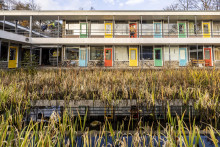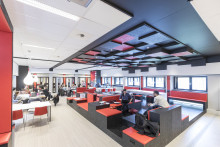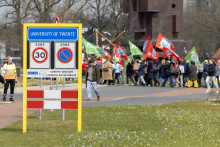As a researcher in the field of energy, Tolboom has been studying developments in the energy market for quite a while. According to him, the urgency and the impact of the crisis are alarming. 'I'm not just talking about the coming winter, but also about the winters thereafter. The rising costs of energy are going to cause a significant change in our lives, whereas we have always seen energy as a low-interest commodity - we always got it, without making an effort. That is going to change.'
According to the PhD candidate, not everyone has this sense of urgency. He is particularly concerned about students. 'The biggest problem is that they don't take action until the bill arrives. And that only comes at the beginning of next year, while they have to take measures before 1 January. Next year, the energy bill per resident will be an average of 100 euros a month higher than it is now. Everyone is going to feel that pain, whether you are in a well-insulated room in the Box of Sky, or in a draughty sixties house at the Calslaan.'
Meeting
That is why he is organising the information session next week, in cooperation with housing corporations SJHT and De Veste, the Energy Desk of the Municipality of Enschede, the UT and Green Hub Twente. 'First of all to share the problem with students, then to talk about the measures you can take and then about the help that is offered, for example by energy coaches from the municipality.'
Behaviour change
According to Tolboom, the best way for students to limit the damage caused by rising energy costs is to change their behaviour. 'Energy-saving products only help a little, but they will be distributed by the housing corporations. Think for example of LED lamps, radiator foil and water-saving showerheads. But there is a lot to be gained in terms of behaviour. Insight into your consumption is the first step towards improvement. And for students who live together, it will be especially important to make good agreements about things like shower time and the temperature in the living room. Or that you don't fill up a swimming pool with hot water during the Christmas dinner and then organise a pool party. Behaviour change only works if you do it together.'
Urgency
Tolboom estimates that students - provided they change their behaviour - can save hundreds of euros on an annual basis. 'Students are often lazy, intelligent and poor. That intelligence will be useful, but they have to get rid of their laziness to prevent becoming even poorer. It's not going to be as cheap as it is now, but it does make a difference if instead of paying 1,600 euros, you only have to pay 1,200 euros.'
How many students will attend the lunch meeting in the Waaier is still difficult for the PhD candidate to say. 'I don't have a goal with the meeting, other than to inform people in a constructive way. Whether the urgency will be felt, that is up to the students. Everyone who attends will benefit from it. There will undoubtedly be students with other plans, but I hope for their sake that a housemate can attend.'
The session takes place on Tuesday 13 September, from 12:45-13:30, in Waaier 2.








